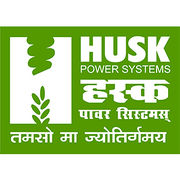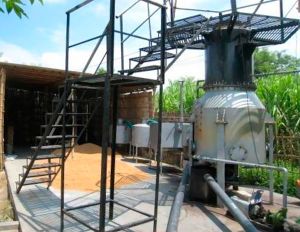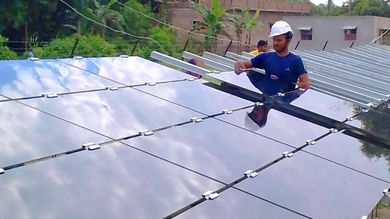Biomass and Solar PV Hybrid Minigrids for Off-Grid Farming Communities
Overview
|
Innovator |
||
|
Project |
Biomass and Solar PV Hybrid Minigrids for Off-Grid Farming Communities | |
|
Collaborators |
Diamond Development Initiatives (Nigeria) | |
|
Location Applied |
Rural, off-grid communities in Ghana and Nigeria that rely on solar PV systems are limited in their hours of agricultural operations and access to electricity. Diesel generators and battery back-ups are expensive to operate, so operations are limited to a single shift.[1]
Clean Energy Solution
Husk Power will install a hybrid solution that combines a biomass gasification system with a solar PV system. The biomass plant uses a proprietary downdraft gasification technology that converts abundant agricultural residue into electricity. The system will power a mini-grid that produces electricity for residential, as well as agricultural, needs. The electricity is distributed to rural households and micro-enterprises through a mini-grid system—providing a better quality, cheaper way to meet their need for energy. Agricultural uses that will be powered include irrigation pumps, agro-processing mills, and drying and heating processes. The biomass plant converts abundant agricultural residue, such as maize cobs, rice husks, coffee husks, and cotton stalks, into electricity.[1]
Impact
The hybrid plant uses a combination of solar and biomass—both abundant resources in the communities selected for installation. Agricultural operations will be able to continue processing during nighttime hours, as the biomass plant will provide power when the solar PV system is not operating. Rural households will enjoy better quality, and cheaper electricity distributed through a mini-grid system. Husk Power is serving approximately 100 households and small businesses with their biomass gasification system. Customers have switched from kerosene- and diesel-powered systems to the Husk mini-grid. However, these customers demand access to reliable and 24/7 power, which is driving the efforts to convert these two sites to the hybrid mini-grid to meet customers’ aspirations. These hybrid sites will enable Husk Power Systems to provide cost effective power to customers during daytime with solar PV and night time with Biomass gasification system.[1]
Organization
Husk Power Systems (HPS) designs, installs, and operates biomass and solar photovoltaic (PV)-based power plants. HPS has partnered with Diamond Development Initiatives (DDI) in Nigeria, and Technology Management Group (TMG) in Ghana. DDI is a not-for-profit development service provider. TMG is an electrical contracting company that provides solutions for rural and urban electrification challenges.[1]
Progress Update
Husk Power Systems has installed 2 hybrid solar/biomass plants in Tanzania. Three additional hybrid minigrids are being installed and will be commissioned by the first quarter of 2019 – all located in Tanzania. They provide 24/7 power, with a discounted tariff for daytime usage in order to pass on the cost benefits of the lower cost of power generation from solar PV. At each site, 3 professionals are trained to operate the systems. Husk’s systems currently use SparkMeter, a product developed as spin-off of the work done by Powering Agriculture Innovator EarthSpark International. Husk Power Systems is in conversations with various partners in Nigeria to identify opportunities.[1]
Further Reading
- Water and Energy for Food (WE4F) portal on energypedia
- Powering Agriculture Homepage, Winners/ Innovators
- Powering Agriculture: An Energy Grand Challenge for Development
- Powering Agriculture Newsletters
- Ghana Energy Situation
- Nigeria Energy Situation
- Website Husk Power Systems
- Website Diamond Development Initiatives
- Website Technology Management Group






















